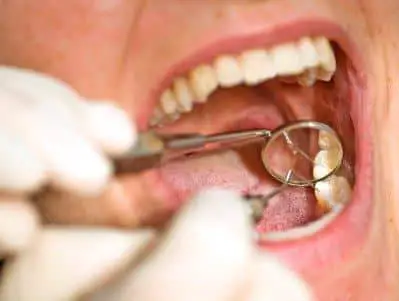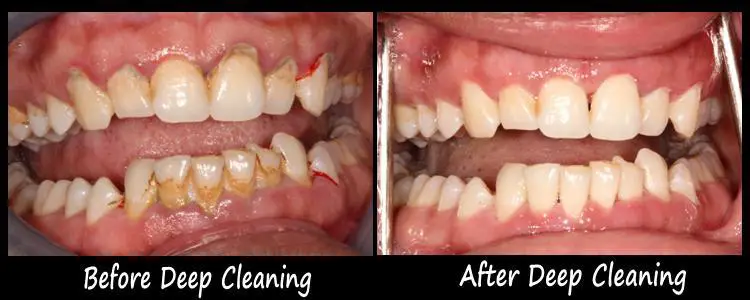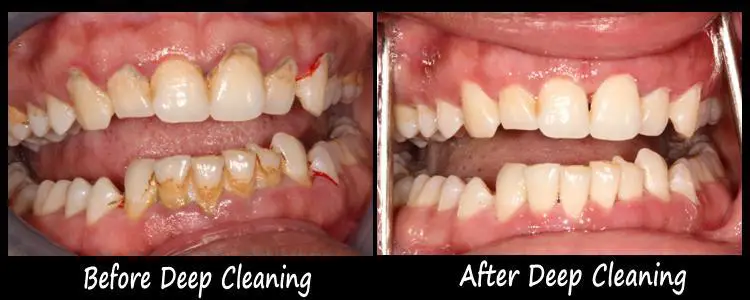If there was a dollar for every time someone asked a dentist ‘can dental cleaning damage teeth?’
we would all be trillionaires today!
And not just this, there are some super smart individuals who even believe in the fact that dental cleaning damages teeth and choose to never get scaling/dental cleaning done.
They also make sure everyone in their surroundings believe the same, or at least know about it, hence the question.
Let me solve this mystery once and for all and tell you that dental cleaning most definitely does not damage teeth!
If anything it saves your teeth and prevents them from being damaged in the long run.
So please don’t listen to such baseless statements.
Coming on to how and why this myth arose, it’s quite simple. The people who have periodontal disease along with loads of calculus usually experience mobility of their teeth post scaling.
But that doesn’t happen because of the scaling technique or the use of the instrument.
It happens when the hard calculus or tartar which was basically keeping the already mobile tooth in place is removed. In reality the tooth was already moving because of all the calculus and poor oral hygiene.
However, if you are still not convinced and need more answers, I’ve got you covered. Please read ahead!
Does Teeth Cleaning Hurt?

I’d be wrong if I said scaling or dental cleaning doesn’t hurt at all. But It would also be wrong to say it hurts.
That’s because, it depends from person to person. If you have maintained good oral hygiene throughout your life and don’t have any gum disease, it’s very likely that your scaling experience will be top notch.
However, if your gums are swollen and in pain and bleed on brushing, it’s likely that the process of scaling will cause some discomfort.
But there is nothing to worry about because it is your dentist’s responsibility to make sure you have a painless experience.
If they think the process of scaling will hurt or cause pain to your gums, they will give you anesthesia prior to the process and make sure your gums are completely numb during scaling.
However, once you have done with your scaling and the anesthesia wears off, there is a possibility of sensitivity around the teeth and gums that were surrounded with calculus.
In that case, carry out some warm saline water rinses for the week ahead and use toothpaste that deals with sensitivity if it’s bothering you too much.
Overall there is nothing to worry about because the sensitivity will wear off within 7 – 10 days.
If you keep a pristine oral hygiene routine, you will be in a much better position when it comes to your next follow up dental cleaning!
Is Dental Cleaning Necessary?
I know there is a lot of inconvenience involved with visiting your dentist every few months just to get your teeth properly cleaned.
I am sure you are also wondering why your dentist would keep reminding you to brush twice a day and floss regularly if getting professional dental cleaning done is so necessary.
The answer to this is despite having good oral hygiene, plaque forms every single day. Your daily brushing and flossing is always going to be helpful in keeping tartar at bay, but there is always some chunk between or under the gums that you cannot catch.
If you love your god-gifted beautiful pearly whites and want them to stay like that, dental cleaning is absolutely 100% necessary.
But this isn’t where it ends…
You are supposed to get regular dental cleanings done because all the caffeine that you inhale throughout the year will most likely leave not-so-pleasing stains on your teeth. And you obviously want to get them removed.
So yeah, dental cleaning for the win!
Last but not least, if you have kids who you argue with before each dental appointment or worse yet, miss a whole day of work just convincing them to go to the dentist’s office, trust me, all this inconvenience is going to be worth it!
Children already don’t like the idea of brushing, let alone flossing. Candies are usually their best friend and despite all the excessive exhortation, they won’t stop eating them!
Therefore, it is necessary for you to take extra care of your child’s oral hygiene.
It’s a good investment taking them to the dentist’s and getting regular dental cleanings.
This will not only save their milk teeth from unsolicited cavities and aches, but save their permanent teeth from growing improperly.
All in all, dental cleanings are an absolute need!
How Is The Dental Cleaning Procedure Carried Out?
I understand what a nerve-racking experience it is to go to a dentist’s office, sit on a dental chair and let them do whatever they want in your mouth in the name of ‘medicine.’
The anxiety and nervousness are all normal and understood.
I am here to give you a step by step guide on how the procedure of dental cleaning is carried out before you head out to get your first (if so) dental cleaning done:
1. Complete Oral Examination
Since dental cleaning is a treatment procedure, a complete oral examination needs to be carried out before scaling. The process of scaling cannot be done without a prompt diagnosis.
when you go to your dentist they will most likely examine every single tooth and look for any decay, mobility, pain or infection. Along with that, a close examination of your gums and periodontal health is carried out.
With the help of an instrument they will also check the depth of the pockets in your gums and determine whether your gum health is good, average, or bad.
2. Scaling

once the complete oral examination has been carried out and the patient is informed of everything, the dental cleaning procedure starts.
Your dentist will take an ultrasonic scaler to remove all the plaque, calculus and stains above your gums. The tip of the scaler is attached to the ultrasonic machine which makes it move rather speedily.
In fact it moves so fast that a constant stream of water is needed to cool it down. If that is not done, the heat generated from the scaler tip can damage the teeth.
Anyhow, your dentist will take the scaler tip, put it in your mouth and let the machine run. They will let it go through each tooth, one at a time and skillfully remove all the plaque, calculus and stains.
3. Root Planing And Curettage
This process is only carried out if needed
If your dentist has diagnosed you with periodontitis, they will make sure that all the exposed surfaces of the root are scraped off of bacteria and the rough surfaces smoothed out.
This is called Root Planing. To treat the deep periodontal pockets, your dentist will take an instrument called curette and take it inside your gum tissue, thereby removing the gingival connective tissue.
This ensures the promotion of new connective tissue attachment to the tooth.
4. Polishing
After the procedure of scaling is completed, your dentist will most likely apply a teeth polish in order to make them look smooth and lustrous.
Side Effects Of Dental Cleaning

If by side effects, you mean what are the possible ‘adverse effects’ of dental cleaning, then let me tell you that there aren’t any.
If anything, your teeth will feel a bit more sensitive than usual but that can easily be taken care of.
Apart from that, if the dentist or dental hygienist isn’t attentive while carrying out the procedure, it’s possible that some trauma to the gums, cheeks, and lips can be caused.
Make sure you go to an experienced dental professional to avoid problems of this nature.
But despite it all, there are absolutely no long term side effects of dental scaling.
If anything, scaling is only for the better!
To Make The Scaling Story Short
Scaling is a procedure that is given the most importance by all dentists. Nevertheless, it comes with a lot of myths.
Some say your teeth will go numb after a professional dental cleaning, while others state that your teeth will start moving. But in reality, none of this is true.
If anything, dental cleaning is only going to help your teeth stay in pristine condition.
If you are wondering whether or not dental cleaning hurts, it depends from person to person.
But nothing to worry about because your dentist will inject a local anesthetic (if needed) before carrying out the procedure to make sure it’s painless!
As far as the procedure itself is concerned, scaling is done by the help of an ultrasonic scaler. It’s a machine that makes the scaler tip move super-fast, thereby ensuring all the stains, plaque and calculus are removed effortlessly.
If you are showing signs of periodontitis, your dentist may also carry out root planing and curettage.
I want to finish by saying there are no long-term side effects of scaling. You might feel that the sensitivity in your teeth has increased, but it’s only short term. It’s likely the sensitivity will go away within a few days.
Go to your dentist once every six months to make your pearly whites pearlier than ever!
References
Oxford Handbook of Clinical Dentistry – Periodontology section
Newman and Carranza’s Clinical Periodontology
